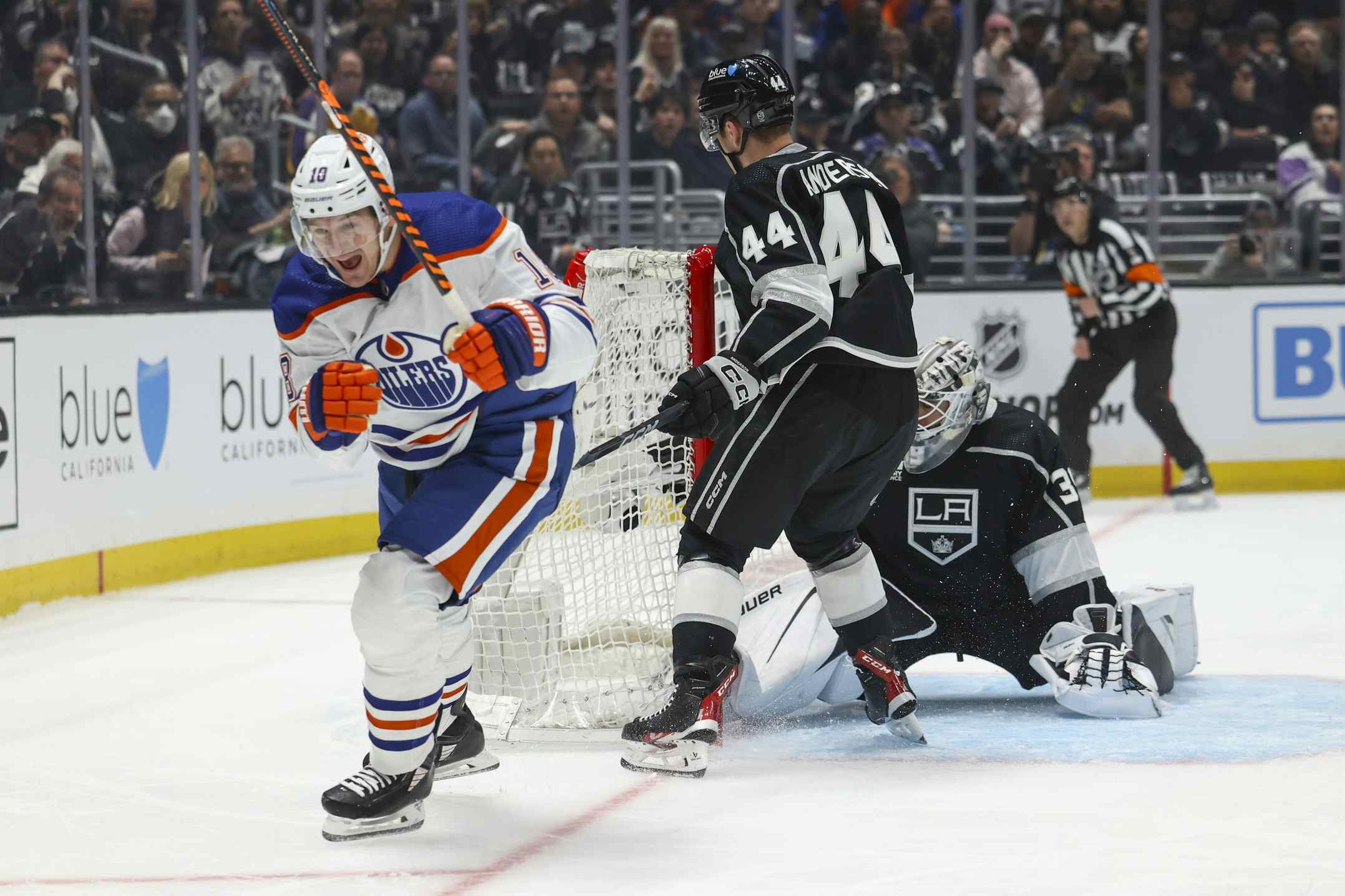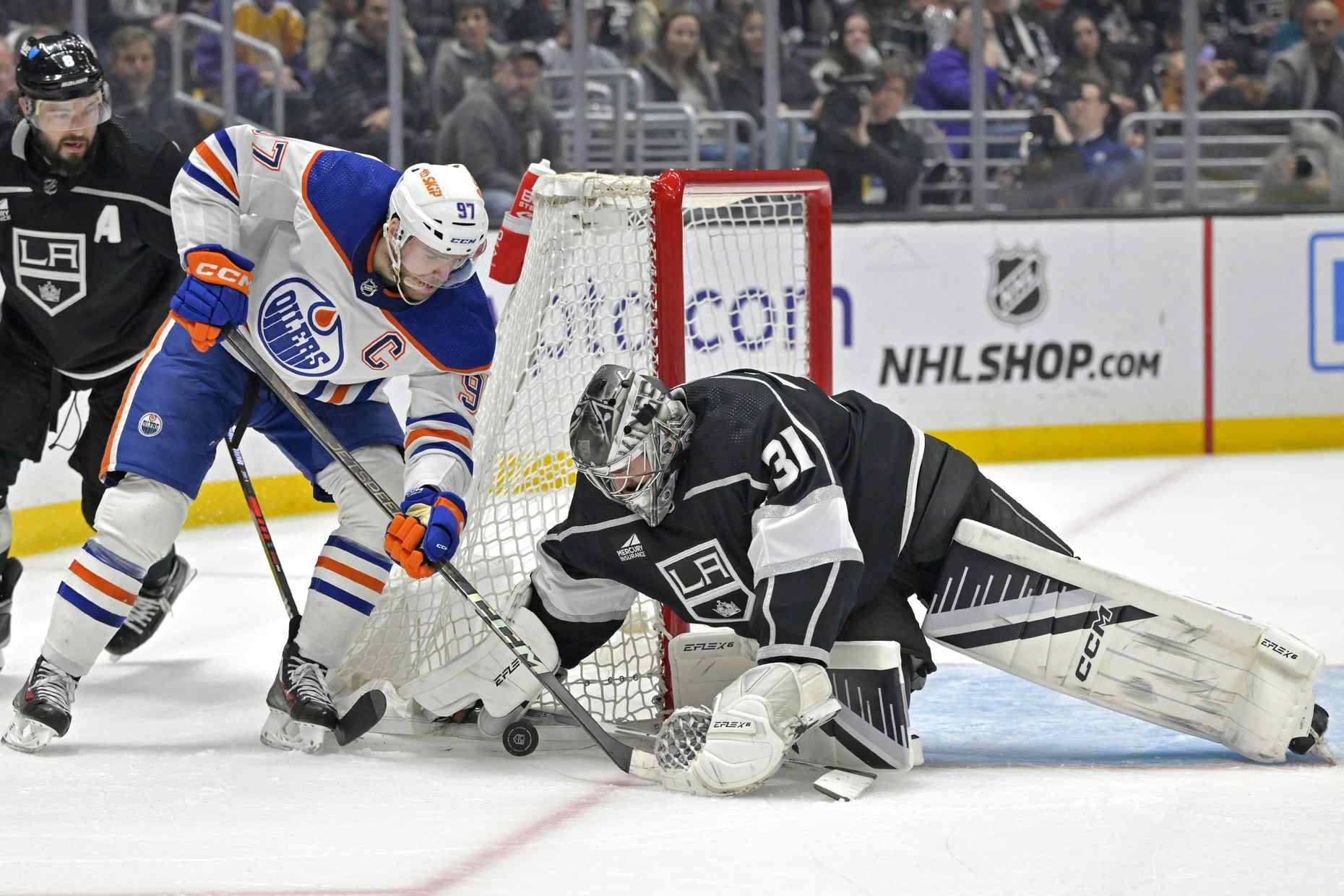NATION PROFILE: WAYNE GRETZKY
By Lowetide
11 years ago
In the history of the game, no one was better at creating scoring chances and goals than Wayne Gretzky. And really, it is not even close. Wayne Gretzky’s ability to think the game, send the puck to isolated places where the shooter had daylight and an angle was breathtaking.

When Wayne Gretzky was 6 years old, his father built a rink in the family’s backyard. On that lonely sheet of ice, the young Gretzky honed his skills and worked for many hours on becoming a better hockey player. He became so good at it, playing against kids his own age was deemed unfair. At six.
Wayne Gretzky became famous as a child for extraordinary feats of goal scoring. He began playing against older boys–at six he played against 10 year olds and scored just one goal–but he quickly became the best player even against much older competition. The phenom scored 378 goals at the Pee Wee level in Brantford. He became known as “the White Tornado” and each season of hockey saw him step up a level of competition and then beat it down as though it were a walk in the park.
From the age of 6, Wayne Gretzky of the Brantford Steelers had the following goal totals in the Ontario Minor Hockey Association:
- Age 6: 1
- Age 7: 27
- Age 8 104
- Age 9: 196
- Age 10: 378 (in 85gp)
By 1975, Wayne Gretzky had moved to Toronto (played for the Nationals of the legendary Metro Toronto Junior “B” League) and scored 60 points in 28 games. In 1977-78, a decade after he began gaining fame, the teenager skated onto OHA (modern OHL) ice as a regular to show the boys what he could do.
He was 16. In his one full season in the OHA, Wayne Gretzky scored (regular season and playoffs) 76gp, 76-132-208. He finished 2nd in scoring that season, to 19-year old Bobby Smith (he turned 20 in February of that year).
At this point in NHL history, Wayne Gretzky would be three years from being draft eligible. Although his talent and drive clearly screamed higher levels, the rules of the game at that time meant NHL teams could not find a way to retain his talents and for Wayne Gretzky to turn pro.
BRIDGING THE GAP

Gretzky at that point was too good for junior (or at least it looked like we would be) and the youngster also had an urge to play at the highest possible level despite his youth. The NHL approached the issue as “the rules are rules”, but the outlaw World Hockey Association had been flirting with the idea of drafting underage players for at least a year–in fact, they had drafted Ken Lineseman as an underager in 1977.
Its important to understand the climate at this time (this is spring 1978). The player has expressed interest in signing a pro contract–perhaps in Europe–in order to further push his skills. The WHA made overtures in the spring, and in April 1978 Gretzky’s agent (Gus Badali) was quoted as saying the young man would forego the final three years of his junior eligibility and sign with the fledgling league should he be drafted. THIS brought forward more hell than a little bit:
- Iona Campagnolo, federal minister of fitness and amateur sport meets with Ben Hatskin, CEO of the WHA in May and tells him the federal government would object to any signings of underage players. Campagnolo: “Mr Hatskin indicated to me that the league has no intention of signing underage players. However, he also said member clubs may have other ideas.”
On June 12, 1978, Nelson Skalbania of the Indianapolis Racers announced that he had signed Wayne Gretzky to a 7-year, $1.75M personal services contract. The gifted youngster had slipped through the fingers of the OHA, and the NHL. This began a long series of idiotic quotes from respected hockey men about Gretzky’s ability–altough offsetting this was Jim McAuley, the owner of the Sault Ste Marie club–who said his first thought was to shut down the club (hyperbole and overreaction became commonplace during this period).
Del Wilson–long the Montreal Canadiens scouting director and an exceptional judge of NHL talent, was quoted as saying “this is a complete disaster. He’s a great hockey player, but he’s not ready for the pro’s. He’ll be playing against guys 30 years and older.” This was followed by other extraordinary claims, like the whopper that got a lot of play during this time suggesting the young Gretzky didn’t have enough talent to make the 1950 Maple Leafs (don’t ask me, there was some weird stuff going on about Gretzky before he flattened the NHL in 79-80).
YEG
Nelson Skalbania sold Wayne Gretzky on a Thursday (Nov. 2, 1978–34 years ago today) and was the first of two men who should have known better. Gretzky, whose motivation was to play hockey at the highest possible level, expressed frustration at the move:

Once Gretzky arrived in Edmonton, it didn’t take long for a bond to form between player and his new city. Gretzky got off the plane as an impact player, and in his first season in Edmonton (and the final WHA season) #99 posted 72, 43-61-104 totals. That single WHA season gets overlooked a lot, but it was very important in establishing Gretzky as a player who could compete at that level. Gretzky himself wasn’t sure–he told his agent Gus Badali that he’d score 20 goals and 40 assists–and probably gave him the confidence to enter the NHL in 1979-80 confident of success.
On January 28, 1979, Wayne Gretzky signed a 21-year contract with Peter Pocklington.
EARLY NHL CAREER
From fall 1979 through his departure from Edmonton (Peter Pocklington, the second man who should have known better, sold his contract to Los Angeles), Wayne Gretzky provided Edmonton and Oiler fans with the highest “peak value” of any player in NHL history. There are no words strong enough to describe the dominance: he was so far beyond what had come before it took years to adjust to the point totals. Even today, Gretzky’s peak seasons look like some kind of fantasy, some impossible misprint in the book of hockey’s past.
Gretzky’s most effective skill was his ability to see the ice, the players and their position and to find the best option for scoring chances. When I was a young man, I’d go to Oilers games with buddies or my wife and watch from the bleeders. Some think it’s a horrible place to watch the game but for me it was an education in the talent and vision of Wayne Gretzky. I’ve said this before, but the beauty of his game was knowing where the open spaces were and who could get there. Many of his passes looked seeing-eye or lucky, but he had a sixth sense and would send the puck to places where Kurri or some other player was heading. Walter Gretzky has spoken many times on this subject and that ability made defending #99 impossible on many shifts.
The gift of Gretzky was that all of his efforts were dedicated to finding the best offensive opportunities that ran counter to the coverage rules of the game.
He was a beauty and it was a privilege to watch him play. I absolutely hate it when old guys (like me) say things like “we’ll never see his equal” but in this case it fits. The Great One? That doesn’t begin to tell the story.
MEMORABLE MOMENTS
Regular Season Records
- Most goals: 894 in 1,487 games
- Most goals, including playoffs: 1,016 in 1,487 regular season and 208 playoff games
- Most goals, one season: 92 in 1981–82, 80-game schedule
- Most goals, one season, including playoffs: 100 in 1983–84, 87 goals in 74 regular season games and 13 goals in 19 playoff games
- Most goals, 50 games from start of season: 61 in 1981–82 (October 7, 1981 to January 22, 1982, 80-game schedule) and 1983–84 (October 5, 1983 to January 25, 1984), 80-game schedule
- Most goals, one period: 4 (Tied with 10 other players) February 18, 1981
- Most assists: 1,963
- Most assists, including playoffs: 2,223
- Most assists, one season: 163 in 1985–86, 80-game schedule
- Most assists, one season, including playoffs: 174 in 1985–86, 163 assists in 80 regular season games and 11 assists in 10 playoff games
- Most assists, one game: 7 (tied with Billy “The Kid” Taylor) on three occasions—February 15, 1980; December 11, 1985; February 14, 1986
- Most assists, one road game: 7 (tied with Billy Taylor) December 11, 1985
- Most points: 2,857 in 1,487 games (894 goals, 1,963 assists)
- Most points, including playoffs: 3,239 in 1,487 regular season and 208 playoff games. (1016 goals, 2223 assists)
- Most points, one season: 215 in 1985–86, 80-game schedule (52 goals, 163 assists)
- Most points, one season, including playoffs: 255 in 1984–85; 208 points in 80 regular season games and 47 points in 18 playoff games
- Most overtime assists, career: 15
- Most goals by a center, career: 894
- Most goals by a center, one season: 92 in 1981–82, 80-game schedule
- Most assists by a center, career: 1,963
- Most assists by a center, one season: 163 in 1985–86, 80-game schedule
- Most points by a center, career: 2,857
- Most points by a center, one season: 215 in 1985–86, 80-game schedule
- Most assists in one game by a player in his first season: 7 on February 15, 1980
- Highest goals-per-game average, one season: 1.18 in 1983–84, 87 goals in 74 games
- Highest assists-per-game average, career (300 min.): 1.321 — 1,963 assists in 1,487 games
- Highest assists-per-game average, one season: 2.04 in 1985–86, 163 assists in 80 games
- Highest points-per-game average, one season (among players with 50-or-more points): 2.77 in 1983–84, 205 points in 74 games
- Most 40-or-more goal seasons: 12 in 20 seasons
- Most consecutive 40-or-more goal seasons: 12 from 1979–80 to 1990–91
- Most 50-or-more goal seasons: 9 (tied with Mike Bossy)
- Most 60-or-more goal seasons: 5 (tied with Mike Bossy)
- Most consecutive 60-or-more goals seasons: 4 from 1981–82 to 1984–85
- Most 100-or-more point seasons: 15
- Most consecutive 100-or-more point seasons: 13 from 1979–80 to 1991–92
- Most three-or-more goal games, career: 50 — 37 three-goal (hat trick) games; nine four-goal games; four five-goal games
- Most three goal games, one season: 10 (done twice) in 1981–82 and 1983–84
- Longest consecutive assist scoring streak: 23 games in 1990–91, 48 assists
- Longest consecutive point-scoring streak: 51 Games in 1983–84 (October 5, 1983 to January 28, 1984, 61 goals, 92 assists for 153 points)
- Longest consecutive point-scoring streak from start of season: 51 in 1983–84; 61 goals, 92 assists for 153 points (October 5, 1983 to January 28, 1984)
Playoff Records
- Most playoff goals, career: 122
- Most playoff assists, career: 260
- Most assists, one playoff year: 31 in 1988 (19 games)
- Most assists in one series (other than final): 14 (tied with Rick Middleton) in 1985 Conference Finals (six games vs. Chicago)
- Most assists in final series: 10 in 1988 (four games, plus suspended game vs. Boston)
- Most assists, one playoff game: 6 (tied with Mikko Leinonen) on April 9, 1987
- Most assists, one playoff period: 3 — Three assists by one player in one period of a playoff game has been recorded on 70 occasions, five of them by Gretzky
- Most points, career: 382 — 122 goals and 260 assists
- Most points, one playoff year: 47 in 1985 (17 goals and 30 assists in 18 games)
- Most points in final series: 13 in 1988 three goals and 10 assists (four games plus suspended game vs. Boston, three goals)
- Most points, one playoff period: 4 (tied with nine other players)
- Most short-handed goals, one playoff year: 3 (tied with five other players) 1983
- Most short-handed goals, one playoff game: 2 (tied with eight other players) April 6, 1983
- Most game-winning goals in playoffs, career: 24 (tied with Brett Hull)
(courtesy Wikipedia)
IT TAKES YOUR BREATH AWAY
Failed to load video.
SALE
It was a sale. If someone calls it a trade, slap them.
August 9, 1988: Oilers trade Wayne Gretzky, Mike Krushelnyski and Marty McSorley to Los Angeles for cash, Jimmy Carson, Martin Gelinas and 3 first round picks (1989, 1991, 1993).

LEGACY
His style was unique and almost impenetrable. The area behind the opposition goal was dubbed “Gretzky’s office” because it was from there that he made so many perfect passes for goals. He was equally known for using the trailing man on rushes rather than a man skating ahead of him. Gretzky would come in over the blue line and then curl, waiting for a defenseman, often Coffey, to join the rush and create a great scoring chance. When on the ice to kill penalties, Gretzky wasn’t looking to ice the puck in a defensive role; he was looking to take the other team by surprise, to take advantage of their defenselessness to score shorthanded. The result was goals and more goals – the Oilers scoring 400 a season as a matter of routine – and Gretzky won the scoring race virtually every year in the 1980s.
GZOWSKI
There are those who think that Gretzky has already established himself as the heir to a tradition of superheroes that dates back to Howie Morenz, whose magic helped the league move from its Canadian beginnings to the bright lights of Broadway, or before Morenz, Joe Malone, who scored 44 goals in the first season the NHL ever played. Gretzky’s importance to the Oilers is impossible to exaggerate. The 137 scoring points he accumulated last year meant he was involved in 44 per cent of their goals.
THE GOAL
Failed to load video.
Recent articles from Lowetide






